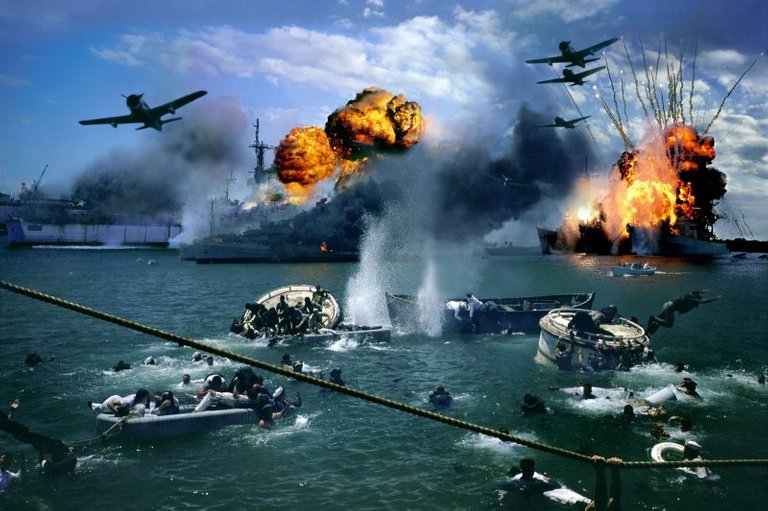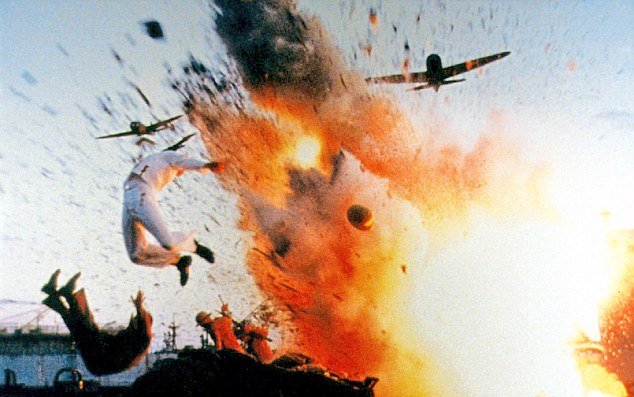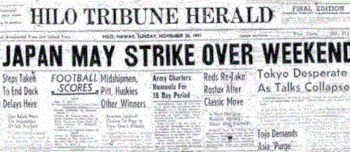
Japan became a subject of infamy after launching a brutal military assault on Pearl Harbour 76 years ago. An attack widely considered one of the most infamous occurrence in the history of America.
On the 7th of December 1941, hundreds of Japanese aircraft unleashed surprise attack on the US Navy's base at Pearl Harbor. This provocative assault wiped out American battleships, destroyers and air installations. 2,335 American personnel were killed while 1,143 were injured. The US lost 68 civilian lives and 35 were wounded.
The loss for the Japanese was nothing compared to the American yet it lost 64 of its personnel, 29 aircraft destroyed while 1 sailor was captured by the US. Kazuo Sakamaki was the Japanese naval officer who became the first Japanese prisoner of war of World War II captured by US forces.
Over 75 years since this gruesome attack on Pearl Harbor, many have questioned the US military intelligence capacity as to why an assault of such magnitude could have been planned and executed by the Japs without no prior knowledge. An occurrence that has been dubbed by many as the worst failure of intelligence in the American history, triggered a plethora of questions and controversies.

Between 1945 to 1946, a joint congressional committee setup for the sole aim of investigating the attack asked a profound question, that most American family who lost a loved one would ask.
"Why with some of the finest intelligence available in our history, with the almost certain knowledge that war was at hand, with plans that contemplated the precise type of attack that was executed by Japan on the morning of December 7 – Why was it possible for a Pearl Harbor to occur?" - Source
During the World War 1, code breaking became an highly important part of military intelligence gathering and nations of the world stopped at nothing to master the art of code breaking. Communication and transmission of messages was critically important between the military personnel and due to the susceptibility of interception, messages were transmitted in codes and ciphers.
The dependence on transmission of messages in codes and ciphers led to the distribution of codebooks to military personnel. Despite it merits, it proved to be a huge security liability as it is susceptible to theft by enemy forces.
Prior to the attack on the Pacific fleet, there were indications of an imminent attack. US intelligence had successfully cracked Japanese diplomatic codes which had raised the awareness and provided Intel of the possibility of an attack from the Japs. But the contention over the years has been the reliability of the success made by cryptanalysis and the Intel received. Whether or not the intel from the decryption was reliable enough to warn the US specifically of an imminent attack on the US naval base remains a major subject of controversies.
Final closure from several investigators made it known that the intelligence gathering process by US intelligence agencies lacked the required coordination to provide informed conclusions good enough for policy makers to act upon. These deductions led to the establishment of the Department of the Defense, the CIA, the White House's National Security Council, and the national security adviser through the 1947 National Security Act.
In Spite of the strong defense made by the US government that the indications of a possible attack weren't good enough neither were the available Intel adequate to warn of an attack let alone the Pearl Harbor attack, there are those who still believe the reverse is the case.
The Senate committee tasked to investigate the occurrence made remarks suggesting that the US had at its disposal the finest intelligence good enough to warn US of the attack and with the almost certain knowledge that war was at hand, avoiding or limiting the colossal loss suffered from the surprise assault could have been possible.
Despite the fact that it has been over seventy five years since the horrific attack by the Japanese, the belief by some Americans that the US allowed the bombing of the US Pacific Fleet at the Pearl Harbor, without taking any pre-emptive move to reduce it impact and loss, remains evergreen.
Conspiracy theorists still hold strong their claim that intelligence available then was adequate, the attack on Pearl Harbor had very little element of surprise and President Franklin D. Roosevelt intentionally ignore the warnings, suggesting that he needed a legitimate reason for declaring war on the Japanese and also keen on drawing the United States army into the theatre of the World War 2.
American journalists and writers, such as Robert Stinnett, retired U.S. Navy Rear Admiral Robert Alfred Theobald, and Harry Elmer Barnes have opposed several US government officials and argued that the US had prior knowledge of the attack but choose not to prevent it in order to create a legitimate entry door into the World War 2.
In the event preceding America's entry into the war, the US had been privately throwing it military weight behind the Allied forces and the public view had been non supportive of the US military joining a war considered by many as a European affair.
While the war was heating up in Europe, Franklin Roosevelt considered some Americans as the isolationist, who held strong their opinions of America keeping a distance from the events in Europe, and the President's critical opposition of such views wasn't a secret. He considered them to be either weak and scared to face a dreadful reality that was gradually dawning on them. President Roosevelt further made it known to the isolationist that fantasies of America remaining a safe oasis in a world dominated by fascist terror should be quickly discarded.
President Franklin Roosevelt's opposing view about America remaining aloof, secure, and distant from the wars raging in Europe laid strong foundation for the confidence in claims made by conspiracy theorists.
Till date many believe the US, being a burgeoning nation and one that was rapidly growing into a world power prior the World War 2, turned the tides of the war by making it full entry into it. Military supply from the US contributed immensely to the overall victory over the Axis forces which consist of Germany, Italy and Japan. Remarks made by Joseph Stalin at the Tehran conference that "without American production, the United Nations could never have won the war" further proves that America was indeed a boost to the Allied forces in conquering the Adolf Htiler's led Axis forces.
As an avid reader of history, the Pearl Harbor bombing remains one of the most interesting occurrence that left far too many controversial footprints on the sands of time. Whether the occurrence was a colossal failure of intelligence or an awaited reason to join the war, one just need to peruse all the fact before taking a stand.

What a good post like this. Thanks for this wonderful impact you have transfered to us. I've learn new things about Pearl Harbor Bombing, which can't be forgetting again in the life of man. I think more people can also learn from me. ...
Thanks so much
Thanks for the nice comment. It is a very significant event in the history of America and also the World war 2. Kindly Upvote and also resteem the post! Thanks!
introduction post
Check out the great posts I already resteemed.Resteemed by @resteembot! Good Luck! Curious? Read @resteembot's
ResteemBot's Maker is Looking for Work.
Tisko Bot
Click here to see how to use Tisko Bot. Send 0.200 Steem or 0.200 SBD and the URL in the memo to @tisko to use the bot for a resteem and to get 5 good upvots.
Congratulations! You were nominated for a TROPHY TOKEN award HERE
by @sammie85 Please comment your Bitshares address to receive your reward! You can also contact us on Discord @Trophy-Token. Thank you for being a great Steemian!
Thanks for the reward! My BTS address is sammie85
TROPHY sent! Keep on steeming on!